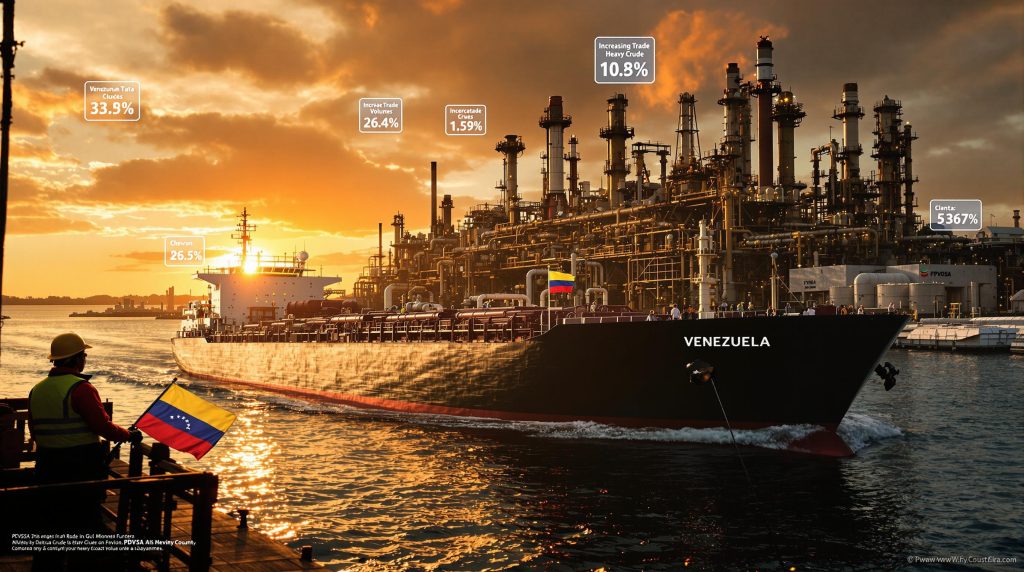Venezuelan Crude Oil Returns to U.S. Markets: A New Chapter in Energy Relations
After years of sanctions and restricted trade, Venezuelan crude oil shipments are making their way back to U.S. refineries following significant policy shifts in late 2023. This resumption marks a turning point in bilateral energy relations, with several major energy companies securing licenses to import Venezuelan heavy crude. The first shipments began arriving in late 2023, with volumes gradually increasing throughout 2024 as logistical channels reopened and commercial relationships were reestablished.
The Biden administration's decision to ease certain oil-related sanctions came amid global energy supply concerns and represented a strategic shift in U.S. tariff policy. While comprehensive sanctions remain in place, specific licenses now allow limited petroleum trade between the two nations.
Key Milestones in the Resumption of Oil Trade
The path to resuming Venezuelan crude imports involved several critical developments:
- U.S. Treasury Department issued specific licenses to selected companies in October 2023
- First shipments arrived at Gulf Coast refineries by December 2023
- Chevron emerged as the primary U.S. company handling Venezuelan crude imports
- Volume has steadily increased from initial test cargoes to more regular shipments
Industry observers note that the resumption process has been measured and carefully controlled, with strict compliance requirements for participating companies. The Treasury Department's Office of Foreign Assets Control (OFAC) maintains oversight of all licensed activities.
How U.S. Sanctions Affected Venezuelan Oil Exports
The U.S. imposed comprehensive sanctions on Venezuela's oil sector in 2019, effectively blocking the country's crude exports to what had historically been its largest market. These restrictions were part of broader economic pressure designed to address political concerns during a period of heightened tensions.
Prior to sanctions, Venezuela exported approximately 800,000 barrels per day to U.S. refineries. This represented not only a crucial market for Venezuela but also an important heavy crude source for specialized U.S. Gulf Coast refineries.
Impact of Sanctions on Venezuela's Oil Industry
The effects of sanctions on Venezuela's petroleum sector were profound and multifaceted:
- Production plummeted from over 2 million barrels per day to under 700,000 bpd
- PDVSA, the state oil company, lost access to international financing
- Critical infrastructure deteriorated due to lack of investment and maintenance
- Venezuela redirected exports to alternative markets, primarily China and India
- Refining capacity within Venezuela declined dramatically
- Government revenue from oil exports fell by more than 70%
The sanctions created a significant void in heavy crude supply for U.S. refiners, who were forced to seek alternatives from Canada, Mexico, and other sources—often at higher costs or with logistical challenges.
Why U.S. Refiners Are Interested in Venezuelan Crude
Venezuelan crude oil possesses specific characteristics that make it particularly valuable to certain U.S. Gulf Coast refineries designed to process heavy, high-sulfur crude varieties. These specialized facilities faced supply challenges when Venezuelan imports were restricted.
Many Gulf Coast refineries were specifically designed or modified to process Venezuelan heavy crude grades, representing billions in infrastructure investments. The unique properties of Venezuelan crude make it difficult to substitute without operational adjustments or efficiency losses.
Advantages of Venezuelan Crude for U.S. Refiners
The appeal of Venezuelan crude stems from several technical and economic factors:
- High density (heavy crude) matches specialized Gulf Coast refinery configurations
- Contains valuable components for producing asphalt and other specialized products
- Provides diversification from Canadian heavy crude supplies
- Shorter shipping routes compared to Middle Eastern alternatives
- Historically established business relationships and technical expertise
- Potential price advantages compared to other heavy crude sources
For refiners like Valero and Chevron, Venezuelan crude offers a way to optimize operations at facilities specifically configured for heavy, high-sulfur feedstocks. The proximity of Venezuela to U.S. Gulf Coast ports also reduces transportation costs and delivery times compared to more distant alternatives.
Companies Involved in the Renewed Oil Trade
Several major energy companies have received licenses to import Venezuelan crude oil, with Chevron taking the leading role in reestablishing trade connections. These companies have long-standing historical ties to Venezuela's oil industry, some dating back decades.
The licensing process has been selective, with the U.S. government granting permissions to companies with existing assets or operational history in Venezuela. This approach aims to balance energy security concerns with broader policy objectives.
Major Players in the Renewed Venezuela-U.S. Oil Trade
The current landscape of companies engaged in Venezuelan crude imports includes:
- Chevron secured the first license to resume operations in Venezuela
- Valero Energy has received cargoes at its Gulf Coast refineries
- PBF Energy has imported Venezuelan crude for its specialized facilities
- Citgo, though Venezuelan-owned but U.S.-operated, faces complex legal hurdles
- Oil trading firms including Trafigura have facilitated some shipments
- PDVSA remains the primary Venezuelan entity controlling exports
Chevron's leading position stems from its maintained presence in Venezuela throughout the sanctions period, albeit with severely restricted operations. The company's longstanding joint ventures with PDVSA provided a foundation for resuming exports once policy conditions allowed.
Volumes of Venezuelan Crude Reaching U.S. Markets
Initial shipments were relatively modest, but volumes have gradually increased as logistical channels reopened. Current estimates suggest approximately 200,000-300,000 barrels per day of Venezuelan crude are now reaching U.S. refineries, still well below historical levels that once exceeded 800,000 barrels per day.
Industry analysts note that technical constraints within Venezuela's production infrastructure, rather than policy limitations, currently represent the primary ceiling on export growth. Deteriorated equipment, reduced reservoir pressure, and personnel shortages all contribute to production challenges.
Current and Projected Import Volumes
| Period | Approximate Daily Volume | Year-on-Year Change |
|---|---|---|
| Q4 2023 | 90,000-120,000 bpd | From zero baseline |
| Q1 2024 | 150,000-180,000 bpd | +50% from Q4 2023 |
| Q2 2024 | 200,000-250,000 bpd | +30% from Q1 2024 |
| Current | 250,000-300,000 bpd | +20% from Q2 2024 |
| Projected 2025 | 350,000-450,000 bpd | +40-50% from current |
These figures represent a significant recovery from zero imports during the full sanctions period but remain far below pre-sanction levels. Market analysts suggest that reaching 500,000 barrels per day would represent an optimistic medium-term target given current conditions.
How Venezuela's Oil Production Capacity Has Changed
Venezuela's oil production capacity has deteriorated significantly over the past decade due to underinvestment, mismanagement, and sanctions. Once producing over 3 million barrels per day, output fell to historic lows below 400,000 barrels per day in 2020 before beginning a modest recovery.
The decline represents one of the most dramatic production collapses in oil industry history, occurring in a country with the world's largest proven oil reserves. Unlike typical production declines related to resource depletion, Venezuela's case primarily reflects above-ground factors.
Current State of Venezuelan Oil Infrastructure
The Venezuelan petroleum sector faces numerous structural challenges:
- Production has rebounded to approximately 900,000-1,000,000 barrels per day
- Significant portions of infrastructure remain in disrepair
- Many oil fields have suffered permanent damage from improper maintenance
- Foreign investment remains limited despite policy changes
- Technical expertise has been depleted through emigration of skilled workers
- Recovery to pre-2015 production levels would require $50-100 billion in investment
Petroleum engineers familiar with Venezuelan operations note that some fields have experienced irreversible damage from improper shutdown procedures, water incursion, or reservoir pressure depletion. These technical realities mean that even with ideal policy conditions, certain production capacity may be permanently lost.
Geopolitical Implications of Resumed Oil Trade
The resumption of Venezuelan crude exports to the U.S. represents a significant shift in regional geopolitics, occurring amid broader changes in global energy markets and international relations. This development has implications for multiple stakeholders across the Americas.
The timing coincides with global energy security concerns related to conflicts in Europe and the Middle East, suggesting pragmatic considerations may have influenced policy adjustments. The move also reflects evolving approaches to sanctions as policy tools.
Geopolitical Dimensions of the Oil Trade Resumption
The renewed energy relationship carries several important implications:
- Represents a pragmatic approach to energy security amid global supply concerns
- Potentially reduces Venezuela's economic dependence on China and Russia
- Creates economic incentives for political dialogue and potential reforms
- Impacts regional relations with other Latin American oil producers
- Affects global heavy crude markets and pricing dynamics
- Raises questions about future sanctions policy and effectiveness
"The resumption of Venezuelan crude flows to U.S. refineries reflects a recognition that energy markets and geopolitics cannot be fully separated. Pragmatic energy security considerations often compete with broader foreign policy objectives." — Energy policy analyst at a Washington think tank
The partial normalization of oil trade may also create space for incremental progress on other bilateral issues, though significant political differences remain unresolved.
How Venezuelan Crude Compares to Other Oil Sources
Venezuelan crude oil has distinctive characteristics that differentiate it from other global oil sources. Understanding these differences helps explain why specific refineries seek this particular type of crude despite logistical and political complications.
The technical properties of Venezuelan crude—particularly from the Orinoco Belt region—make it uniquely suited for certain refining processes but challenging to extract and process. These distinctive characteristics create both advantages and challenges.
Comparative Analysis of Venezuelan Crude
| Characteristic | Venezuelan Heavy | WTI (U.S.) | Brent (North Sea) | Saudi Arabian Light |
|---|---|---|---|---|
| API Gravity | 8-20° (extra heavy) | 39-40° (light) | 38° (light) | 33-34° (medium) |
| Sulfur Content | 2-4% (high) | 0.24% (low) | 0.37% (low) | 1.7% (medium) |
| Vanadium | High | Low | Low | Medium |
| Refining Complexity | High | Low | Low | Medium |
| Transportation Cost to U.S. | Medium | Low | High | High |
| Typical Price vs. Benchmark | -$5 to -$15 | Benchmark | +$2 to +$5 | +$1 to +$3 |
The extremely heavy nature of Venezuelan crude requires specialized handling throughout the production and refining process. While this creates challenges, it also means Venezuelan crude typically sells at a discount to global benchmarks, offering potential margin advantages for properly equipped refiners.
Challenges Remaining for Venezuela's Oil Industry
Despite the resumption of some exports to the U.S., Venezuela's oil industry faces numerous persistent challenges that will limit its ability to rapidly increase production and export volumes in the near term.
The combination of technical, financial, and human resource constraints creates a complex recovery environment that will require time and substantial investment to address. Even with improved external conditions, internal challenges remain significant.
Ongoing Obstacles to Industry Recovery
Venezuela's petroleum sector must overcome multiple hurdles:
- Severe infrastructure deterioration requiring massive capital investment
- Continued political uncertainty affecting investment decisions
- Shortage of technical expertise and experienced personnel
- Lingering effects of sanctions on equipment imports and financing
- Environmental concerns including frequent oil spills and gas flaring
- Competition from other heavy crude producers including Canada and Mexico
- Declining global demand projections for heavy crude in long-term energy scenarios
Industry experts emphasize that decades of underinvestment cannot be quickly reversed. Critical equipment—from drilling rigs to pumps, compressors, and pipeline infrastructure—requires not just maintenance but often complete replacement.
The Future of U.S.-Venezuela Oil Relations
The trajectory of U.S.-Venezuela oil trade depends on multiple factors including political developments, investment climate changes, and broader energy market trends. Several potential scenarios could unfold in the coming years.
Energy analysts note that the relationship is likely to remain sensitive to both political developments and market conditions. The oil price movements and energy transition toward lower-carbon sources add additional layers of complexity to long-term forecasting.
Future Scenarios for Bilateral Oil Relations
Multiple potential pathways exist for the evolving energy relationship:
- Gradual Expansion: Steady increase in trade volumes as sanctions relief continues and investment grows
- Limited Recovery: Trade stabilizes at current levels due to technical constraints and political uncertainties
- Renewed Restrictions: Political developments lead to reimposition of stricter limitations
- Major Breakthrough: Comprehensive political and economic reforms trigger significant investment and production growth
- Market-Driven Decline: Global energy transition reduces demand for heavy crude regardless of political factors
The most likely scenario, according to industry observers, involves continued gradual recovery with periodic adjustments based on political developments and compliance with established conditions. However, recent OPEC meeting impact and decisions could also influence this dynamic significantly.
FAQ: Venezuelan Crude Oil Exports to the U.S.
Are all U.S. sanctions on Venezuelan oil now lifted?
No, the current situation represents a limited easing of restrictions through specific licenses granted to selected companies. Comprehensive sanctions remain in place, with exceptions made for certain transactions and entities. The Treasury Department maintains significant oversight of all permitted activities.
How does Venezuelan crude affect U.S. gasoline prices?
The impact on retail gasoline prices is minimal, as Venezuelan crude primarily affects specialized products like asphalt and industrial fuels rather than gasoline production. The volumes currently imported represent a small fraction of total U.S. crude imports—less than 2% of overall petroleum imports.
What percentage of Venezuela's current exports go to the U.S.?
Approximately 30-40% of Venezuela's current oil exports are now directed to the U.S. market, compared to over 60% before sanctions. China remains a significant destination for Venezuelan crude, having established itself as the primary alternative buyer during the sanctions period.
Could Venezuela return to its peak production levels?
Most energy analysts consider it highly unlikely that Venezuela will return to its peak production of over 3 million barrels per day in the foreseeable future. More realistic medium-term targets focus on stabilizing at 1.5-2 million barrels per day, which would still require substantial investment and technical assistance.
How does the resumption of trade affect global oil prices?
The current volumes have minimal impact on global oil benchmarks, though they do influence specific heavy crude pricing in regional markets. A significant expansion of Venezuelan exports could eventually put downward pressure on heavy crude differentials, particularly affecting Canadian producers of similar grades. Concerns about stagnant oil prices remain a factor in market analyses.
What environmental concerns surround Venezuelan oil production?
Venezuela's oil industry faces serious environmental challenges including frequent spills from aging infrastructure, significant methane emissions from gas flaring, and the inherently higher carbon intensity of extracting and refining extra-heavy crude oil. Additionally, the Alaska oil policy shift has drawn comparisons to environmental considerations in Venezuelan production. Addressing these issues will require substantial investment in environmental protection systems.
Further Reading on Venezuelan Crude Oil Exports
Readers interested in learning more about the evolving dynamics of Venezuelan crude oil exports can explore additional resources that offer ongoing coverage of global energy markets and geopolitical developments affecting oil trade patterns. Industry publications, government data sources, and academic research provide deeper insight into this complex topic.
Understanding the technical, economic, and political dimensions of Venezuelan oil exports offers valuable perspective on broader energy security issues and the practical challenges of global energy interdependence in a changing market landscape.
Interested in Discovering the Next Major Mineral Investment Opportunity?
Discovery Alert's proprietary Discovery IQ model instantly notifies investors about significant ASX mineral discoveries, transforming complex data into actionable insights for both short-term traders and long-term investors. Explore why historic discoveries can generate substantial returns by visiting Discovery Alert's dedicated discoveries page and begin your 30-day free trial today.




